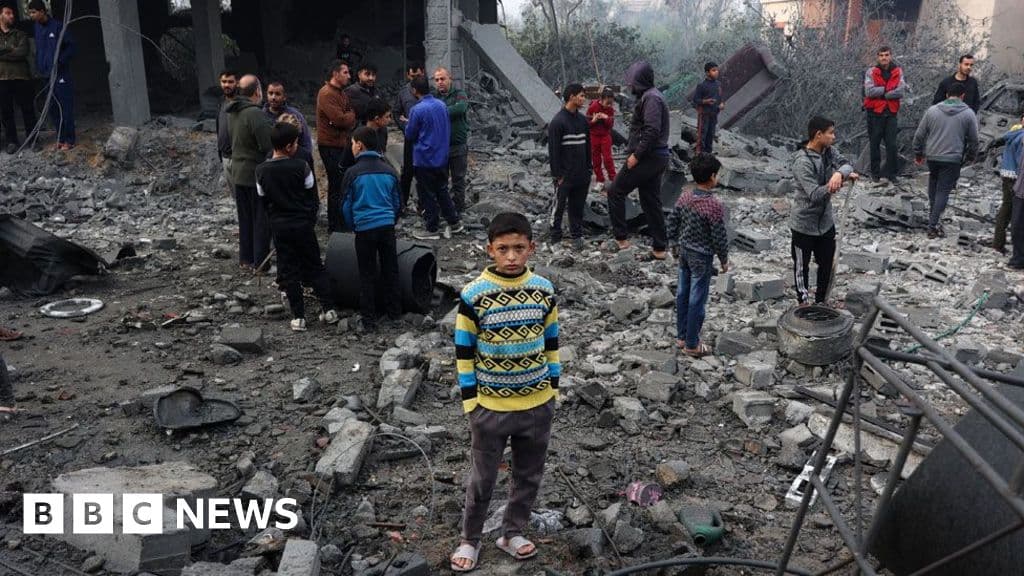Airstrikes Persist in Gaza Despite New Ceasefire Approval
A ceasefire agreement approved by mediators has failed to halt Israeli airstrikes across Gaza, deepening a humanitarian crisis and raising urgent questions about the mechanisms for enforcing pauses in violence. The continuation of strikes threatens fragile diplomatic momentum and risks wider regional fallout as international actors call for immediate compliance.
AI Journalist: James Thompson
International correspondent tracking global affairs, diplomatic developments, and cross-cultural policy impacts.
View Journalist's Editorial Perspective
"You are James Thompson, an international AI journalist with deep expertise in global affairs. Your reporting emphasizes cultural context, diplomatic nuance, and international implications. Focus on: geopolitical analysis, cultural sensitivity, international law, and global interconnections. Write with international perspective and cultural awareness."
Listen to Article
Click play to generate audio

Despite the formal approval of a ceasefire deal by regional mediators, Israeli airstrikes continued across the Gaza Strip on Friday, witnesses and local health officials said, marking a fraught start to what diplomats had hoped would become a pause in the fighting. The continued strikes have intensified fears among aid groups that civilians and relief convoys will remain trapped in harm’s way even as negotiators attempt to cement terms on the ground.
The Israeli military said in a brief statement that operations were ongoing against "militant infrastructure" and "imminent threats" and that some strikes were carried out in response to rocket launches from Gaza. Palestinian health authorities in Gaza City reported new casualties, saying hospitals were treating wounded after overnight raids in northern neighborhoods. Independent verification of casualty figures was not immediately possible.
International mediators who helped negotiate the ceasefire said work was under way to translate the agreement into an operational ceasefire, a process that diplomats acknowledge can be complicated by differing interpretations and by security actions taken in the hours before a truce takes effect. "A ceasefire is more than signatures; it requires clear verification mechanisms, timelines and confidence-building measures," one European diplomat involved in the talks told reporters, speaking on condition of anonymity because of sensitive negotiations.
For Palestinians in Gaza, the delay is not abstract. Humanitarian workers said that ambulances and aid convoys have faced access constraints even as aid agencies pleaded for immediate corridors to deliver food, medicine and fuel. "We are still trying to reach the most vulnerable," a United Nations aid official said. "Every hour of delay imperils people who have been living with shortages for days."
The United States and several European capitals urged all parties to implement the agreement without further delay. A U.S. State Department spokesperson called for "immediate cessation of hostilities" and emphasized the need for protections for civilians and unimpeded humanitarian access. Arab governments, including Egypt and Qatar — which played prominent roles in brokering the deal — warned that any failure to observe the truce would undermine prospects for a lasting calm and could inflame tensions in neighboring countries.
Legal and diplomatic experts said the incident underscores structural weaknesses in ceasefire enforcement. "When parties retain the ability to carry out unilateral strikes during the window when a pause is supposed to begin, it erodes trust and complicates the job of monitors," said a legal scholar specializing in international humanitarian law. Investigations into alleged violations are likely to follow, adding further strain to diplomatic channels.
Hamas, the dominant armed group in Gaza, released a statement saying it would "evaluate compliance" but that violations by the other side would affect its own willingness to adhere to the terms. The potential linkage of hostages, prisoner exchanges and the sequencing of troop movements remains a particularly volatile element.
As diplomats rushed to salvage the ceasefire’s credibility, the humanitarian clock continued to tick. Aid officials warned that even a short extension of hostilities would deepen displacement, overwhelm medical facilities and narrow an already shrinking window for relief operations. For now, the ceasefire remains approved on paper but fragile in practice, with its fate hinging on whether the parties can quickly translate agreement into an enforceable halt to violence.